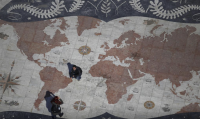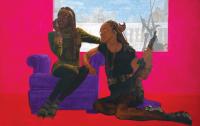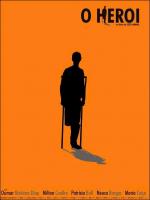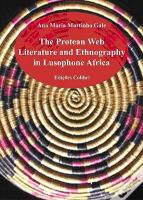 The memorial - rows of palm trees painted in black - was designed by Angolan artist Kiluanji Kia Henda and funded by Lisbon council. It will stand in the centre of the city.
From the 15th to the 19th century, Portuguese vessels carried close to 6 million enslaved Africans across the Atlantic, more than any other nation, but up to now Portugal has rarely commented on its past actions and little is taught about its role in slavery in schools.
Rather, Portugal’s colonial era, which saw countries including Angola, Mozambique, Brazil, Cape Verde, East Timor as well as parts of India subjected to Portuguese rule, is often perceived as a source of pride.
The memorial - rows of palm trees painted in black - was designed by Angolan artist Kiluanji Kia Henda and funded by Lisbon council. It will stand in the centre of the city.
From the 15th to the 19th century, Portuguese vessels carried close to 6 million enslaved Africans across the Atlantic, more than any other nation, but up to now Portugal has rarely commented on its past actions and little is taught about its role in slavery in schools.
Rather, Portugal’s colonial era, which saw countries including Angola, Mozambique, Brazil, Cape Verde, East Timor as well as parts of India subjected to Portuguese rule, is often perceived as a source of pride.
Games Without Borders
24.03.2021 | by Catarina Demony and Victoria Waldersee
 To celebrate the 45th anniversary of Angola's Independence, the ATD and GERAÇÃO 80 in collaboration with TPA, Mostra de Cinemas Africanos and PlatinaLine will be shown documentaries of the project "Angola - Nos Trilhos da Independência”, “Independence”, “Women of Arms”, “São Nicolau - They Haven't Forgotten” and “The Persistent Fragility of Memory”.
To celebrate the 45th anniversary of Angola's Independence, the ATD and GERAÇÃO 80 in collaboration with TPA, Mostra de Cinemas Africanos and PlatinaLine will be shown documentaries of the project "Angola - Nos Trilhos da Independência”, “Independence”, “Women of Arms”, “São Nicolau - They Haven't Forgotten” and “The Persistent Fragility of Memory”.
Afroscreen
11.11.2020 | by Geração 80
 Historian Marissa Moorman wrote an important book about radio and modern state power. "Only radio receivers can feel radio waves. But people feel radio. Radio, Moorman reminds us, courses through our lives everywhere we go and alongside everything we do."
Historian Marissa Moorman wrote an important book about radio and modern state power. "Only radio receivers can feel radio waves. But people feel radio. Radio, Moorman reminds us, courses through our lives everywhere we go and alongside everything we do."
To read
15.11.2019 | by Jesse Bucher
 The first time I saw Rainha Nzinga of Matamba, I was walking across Luanda's Kinaxixi square with a friend. We stopped to admire the vast bronze tribute to the seventeenth-century Mbundu monarch, who not only fought Portuguese armies, but caused consternation among her own people and played a significant role in developing the Angolan slave trade. I was immediately impressed by the statue, although my friend, an Angolan journalist, was less so. 'In real life, you'd have seen her breasts,' he said, 'but they've been covered up to appease our modern sensibilities.'
The first time I saw Rainha Nzinga of Matamba, I was walking across Luanda's Kinaxixi square with a friend. We stopped to admire the vast bronze tribute to the seventeenth-century Mbundu monarch, who not only fought Portuguese armies, but caused consternation among her own people and played a significant role in developing the Angolan slave trade. I was immediately impressed by the statue, although my friend, an Angolan journalist, was less so. 'In real life, you'd have seen her breasts,' he said, 'but they've been covered up to appease our modern sensibilities.'
Face to face
06.11.2012 | by Lara Pawson
 This article uses a reading of Zézé Gamboa's award-winning 2004 feature as a basis for an exploration of post-conflict Angolan screen culture and of its impact both at home and internationally. It considers how O Herói‟s depiction of a war-torn nation, and of the impediments to its reconstruction, negotiates between a socially-engaged film-making practice, informed by local tradition and the tenets of „Third Cinema‟, and the demands of a globalised cinema market. The film achieves this compromise by deploying allegorical and symbolic tropes, familiar from the literature, cinema, and political discourse of the era of Angolan liberation (notably, the concept of a socialist „new man‟), to complicate a superficially optimistic story of post-conflict rehabilitation, and to insinuate a critique of the authoritarian practices and neo-liberal policies of the MPLA government.
This article uses a reading of Zézé Gamboa's award-winning 2004 feature as a basis for an exploration of post-conflict Angolan screen culture and of its impact both at home and internationally. It considers how O Herói‟s depiction of a war-torn nation, and of the impediments to its reconstruction, negotiates between a socially-engaged film-making practice, informed by local tradition and the tenets of „Third Cinema‟, and the demands of a globalised cinema market. The film achieves this compromise by deploying allegorical and symbolic tropes, familiar from the literature, cinema, and political discourse of the era of Angolan liberation (notably, the concept of a socialist „new man‟), to complicate a superficially optimistic story of post-conflict rehabilitation, and to insinuate a critique of the authoritarian practices and neo-liberal policies of the MPLA government.
Afroscreen
19.12.2011 | by Mark Sabine
 This book discusses colonial and postcolonial textuality under the theoretical scope of Literary Theory, Cultural Critique and Anthropology.
It focuses mostly but not exclusively on Angola and Moçambique. In these countries, Ethnographic Fiction has emerged as a genre that inspired until this day "violent readings" of history and society.
This book discusses colonial and postcolonial textuality under the theoretical scope of Literary Theory, Cultural Critique and Anthropology.
It focuses mostly but not exclusively on Angola and Moçambique. In these countries, Ethnographic Fiction has emerged as a genre that inspired until this day "violent readings" of history and society.
Mukanda
29.11.2011 | by Ana Maria Mão-de-Ferro Martinho
 The memorial - rows of palm trees painted in black - was designed by Angolan artist Kiluanji Kia Henda and funded by Lisbon council. It will stand in the centre of the city.
From the 15th to the 19th century, Portuguese vessels carried close to 6 million enslaved Africans across the Atlantic, more than any other nation, but up to now Portugal has rarely commented on its past actions and little is taught about its role in slavery in schools.
Rather, Portugal’s colonial era, which saw countries including Angola, Mozambique, Brazil, Cape Verde, East Timor as well as parts of India subjected to Portuguese rule, is often perceived as a source of pride.
The memorial - rows of palm trees painted in black - was designed by Angolan artist Kiluanji Kia Henda and funded by Lisbon council. It will stand in the centre of the city.
From the 15th to the 19th century, Portuguese vessels carried close to 6 million enslaved Africans across the Atlantic, more than any other nation, but up to now Portugal has rarely commented on its past actions and little is taught about its role in slavery in schools.
Rather, Portugal’s colonial era, which saw countries including Angola, Mozambique, Brazil, Cape Verde, East Timor as well as parts of India subjected to Portuguese rule, is often perceived as a source of pride.  To celebrate the 45th anniversary of Angola's Independence, the ATD and GERAÇÃO 80 in collaboration with TPA, Mostra de Cinemas Africanos and PlatinaLine will be shown documentaries of the project "Angola - Nos Trilhos da Independência”, “Independence”, “Women of Arms”, “São Nicolau - They Haven't Forgotten” and “The Persistent Fragility of Memory”.
To celebrate the 45th anniversary of Angola's Independence, the ATD and GERAÇÃO 80 in collaboration with TPA, Mostra de Cinemas Africanos and PlatinaLine will be shown documentaries of the project "Angola - Nos Trilhos da Independência”, “Independence”, “Women of Arms”, “São Nicolau - They Haven't Forgotten” and “The Persistent Fragility of Memory”.  Historian Marissa Moorman wrote an important book about radio and modern state power. "Only radio receivers can feel radio waves. But people feel radio. Radio, Moorman reminds us, courses through our lives everywhere we go and alongside everything we do."
Historian Marissa Moorman wrote an important book about radio and modern state power. "Only radio receivers can feel radio waves. But people feel radio. Radio, Moorman reminds us, courses through our lives everywhere we go and alongside everything we do."  The first time I saw Rainha Nzinga of Matamba, I was walking across Luanda's Kinaxixi square with a friend. We stopped to admire the vast bronze tribute to the seventeenth-century Mbundu monarch, who not only fought Portuguese armies, but caused consternation among her own people and played a significant role in developing the Angolan slave trade. I was immediately impressed by the statue, although my friend, an Angolan journalist, was less so. 'In real life, you'd have seen her breasts,' he said, 'but they've been covered up to appease our modern sensibilities.'
The first time I saw Rainha Nzinga of Matamba, I was walking across Luanda's Kinaxixi square with a friend. We stopped to admire the vast bronze tribute to the seventeenth-century Mbundu monarch, who not only fought Portuguese armies, but caused consternation among her own people and played a significant role in developing the Angolan slave trade. I was immediately impressed by the statue, although my friend, an Angolan journalist, was less so. 'In real life, you'd have seen her breasts,' he said, 'but they've been covered up to appease our modern sensibilities.'
 This article uses a reading of Zézé Gamboa's award-winning 2004 feature as a basis for an exploration of post-conflict Angolan screen culture and of its impact both at home and internationally. It considers how O Herói‟s depiction of a war-torn nation, and of the impediments to its reconstruction, negotiates between a socially-engaged film-making practice, informed by local tradition and the tenets of „Third Cinema‟, and the demands of a globalised cinema market. The film achieves this compromise by deploying allegorical and symbolic tropes, familiar from the literature, cinema, and political discourse of the era of Angolan liberation (notably, the concept of a socialist „new man‟), to complicate a superficially optimistic story of post-conflict rehabilitation, and to insinuate a critique of the authoritarian practices and neo-liberal policies of the MPLA government.
This article uses a reading of Zézé Gamboa's award-winning 2004 feature as a basis for an exploration of post-conflict Angolan screen culture and of its impact both at home and internationally. It considers how O Herói‟s depiction of a war-torn nation, and of the impediments to its reconstruction, negotiates between a socially-engaged film-making practice, informed by local tradition and the tenets of „Third Cinema‟, and the demands of a globalised cinema market. The film achieves this compromise by deploying allegorical and symbolic tropes, familiar from the literature, cinema, and political discourse of the era of Angolan liberation (notably, the concept of a socialist „new man‟), to complicate a superficially optimistic story of post-conflict rehabilitation, and to insinuate a critique of the authoritarian practices and neo-liberal policies of the MPLA government.  This book discusses colonial and postcolonial textuality under the theoretical scope of Literary Theory, Cultural Critique and Anthropology.
It focuses mostly but not exclusively on Angola and Moçambique. In these countries, Ethnographic Fiction has emerged as a genre that inspired until this day "violent readings" of history and society.
This book discusses colonial and postcolonial textuality under the theoretical scope of Literary Theory, Cultural Critique and Anthropology.
It focuses mostly but not exclusively on Angola and Moçambique. In these countries, Ethnographic Fiction has emerged as a genre that inspired until this day "violent readings" of history and society. 